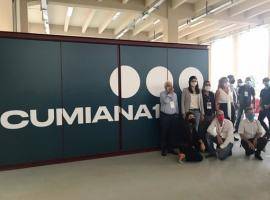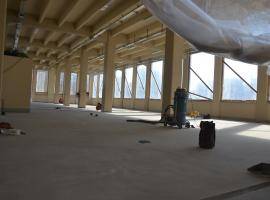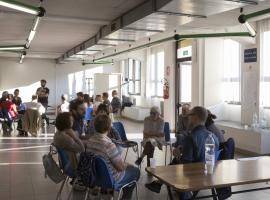Rethinking the future of the former factory of Via Cumiana: the collaboration between residents and associations at the Co-City Lab

The abandoned factory was included in the list of the buildings to be regenerated through the collaborative process promoted by the City of Turin, in close cooperation with the groups of residents and associations who are proposing Pacts of Collaboration in order to create new services and activities in the structures selected by the City.
Indeed, the type and the amount of the works required to regenerate the building are not the most relevant aspects of the rehabilitation of the former Lancia factory. Following the main elements included in the project idea called Futurboita, selected among the proposals for Pacts of Collaboration received by the City after the launch of the Co-City’s public call, a well-structured process of co-creation is aimed at promoting social innovation and inclusion in a brand new way.
The challenge shared by the organisations which proposed the Pact of Collaboration (among them, a group of associations active in the field of promotion of sport and physical activities) is to revive this hybrid space, an open structure without windows to be turned into a covered square.
Ideas and proposals to reconvert the former Lancia factory of Via Cumiana were the main focus of the exchange among the participants of the Co-City Lab, the event held on 30 May in the premises of the Circoscrizione 3, the third district of Turin, whose offices are hosted on a side of the structure to be reconverted.
During the working groups, the presentations and the site visits organized in the framework of the event, the residents and the representatives of local associations had the opportunity to discover the building at the core of the action proposed by the Co-City project, as well as to know more about Borgo San Paolo, the first neighborhood of Turin to be inhabited in the 1950s by workers coming from Southern Italy to be employed by the automotive factories of Turin. The social mix, given by the presence of elderly residents, university students and a growing community of migrants from Peru and Maghreb, is today a characteristic element of the area.
The creation of new spaces to foster the community spirit and the interaction among residents emerged as the main challenge by an investigation conducted among teachers, families and students of the primary school Mazzarello, located nearby the former Lancia factory. According to the survey carried out before the Co-City Lab, the structure is not just seen as a symbol of urban decline but as a part of the identity of the neighborhood, with a great potential to foster social and economic growth.
During the Lab, this vision was shared by all the participants who gave interesting inputs to integrate the Futurboita project initially approved, in view of creating a multifunctional space to be revived with a variety of activities and a solid management model.
The creation of a study space, the definition of new public spaces for families and elderly residents, the opening of a “neighborhood concierge”, the organization of cultural activities co-produced by artists and locals, as side events of book fairs and music or theatre festivals carried out in other areas of Turin: these are just some of the ideas emerged by the dialogue between the residents and the organizations in charge of completing and implementing the Pact of Collaboration for the future management of the space located in Via Cumiana.
Along with the completion of the construction works, the Pact will be finalized in the coming months with the objective of making the former Lancia factory open to the public.























